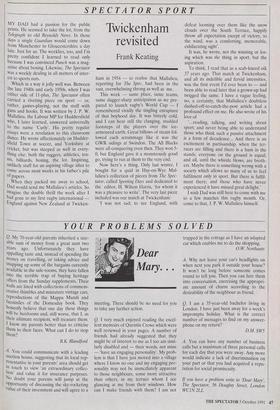SPECTATOR SPORT
Twickenham revisited
Frank Keating
MY DAD had a passion for the public prints. He seemed to take the lot, from the Telegraph to old Reynolds News. In those days a single Guardian would come down from Manchester to Gloucestershire a day late. Just for us. The weeklies, too, and I'm pretty confident I learned to read only because I was convinced Punch was a mag- azine about boxing. Likewise, The Spectator was a weekly dealing in all matters of inter- est to sports nuts.
Which in a way it jolly well was. Between the late 1940s and early 1950s, when I was either side of 11-plus, The Spectator often carried a riveting piece on sport — or, rather, games-playing, not the stuff with guns and hooks. It was written by J. P. W. Mallalieu, the Labour MP for Huddersfield Who, I later learned, answered universally to the name 'Curly'. His pretty regular essays were a revelation to this classroom dunce. He wrote affectionately on Hudder- sfield Town at soccer, and Yorkshire at cricket, but was steeped as well in every- thing else: both the ruggers, athletics, ten- nis, billiards, boxing, the lot. Inspiring, unlikely stuff for an aspiring village idiot to Come across most weeks in his father's pile of papers.
When they packed me away to school, Dad would send me Mallalieu's articles. So imagine the double thrill the week after I had gone to my first rugby international England against New Zealand at Twicken-
ham in 1954 — to realise that Mallalieu, reporting for The Spec, had been in the vast, overwhelming throng as well as me.
This week — same place, same teams, same dagger-sharp anticipation as we pre- pared to launch rugby's World Cup — remembered vividly the tingling enrapture of that boyhood day. It was bitterly cold, and I can hear still the clanging, studded footsteps of the players over the ice- armoured earth. Great billows of steam fol- lowed each scrummage like it was the GWR sidings at Swindon. The All Blacks were all-conquering even then. They won 5- 0, but England gave it a monstrously good go, trying to run at them to the very end.
Now here's a thing. Only last winter, I bought for a quid in Hay-on-Wye Mal- lalieu's collection of pieces from The Spec- tator, called Sporting Days and dedicated to the editor, H. Wilson Harris, `for whom it was a pleasure to write'. The very last piece included was our match at Twickenham:
'I was not sad; to see England, with defeat looming over them like the snow clouds over the South Terrace, happily throw all expectation except of victory, to the wind, was a comforting, memorable, exhilarating sight'.
It was, he wrote, not the winning or los- ing which was the thing in sport, but the aspiration.
To think, I read that as a scab-kneed oik 37 years ago. That match at Twickenham, and all its indelible and fervid intensities, was the first event I'd ever been to — and been able to read later that a grown-up had twigged the same. I have a vague feeling, no, a certainty, that Maltalieu's doubtless dashed-off-to-catch-the-post article had a profound effect on me. He also wrote of his love of `...reading, talking, and writing about sport; and never being able to understand those who think such a passive attachment is a form of decadence... And there is an excitement in partisanship, when the ter- races are filling and there is a hum in the stands, everyone on the ground is equal; and all, until the whistle blows, are broth- ers. Maybe there is something wrong with a society which allows so many of us to feel fulfilment only in sport. But there is fulfil- ment there; and those who have never experienced it have missed great delight.'
I wish Dad was still here to come with me to a few matches this rugby month. Or, come to that, J. P. W. Mallalieu himself.


















































 Previous page
Previous page